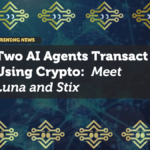
Stanford Embraces AI Agents: From Crypto Buzz to Mainstream Adoption
AI agents have been a hot topic in crypto, automating trades, interacting with smart contracts, and even negotiating deals on the blockchain. But now, the buzz is going mainstream. In a surprising twist, Stanford University has announced its deep dive into AI agent research, signaling that this isn’t just a niche trend anymore.
Unexpected? Yes. Exciting? Absolutely.
Let’s break down why Stanford’s move into AI agents matters and how it’s paving the way for widespread adoption beyond the crypto world.
1. What Are AI Agents, and Why Do They Matter?
AI agents are autonomous systems powered by artificial intelligence, capable of executing tasks, making decisions, and interacting with both humans and other systems.
In the Crypto World:
- Trading Bots: AI agents execute trades at lightning speed, often outperforming human traders.
- Smart Contracts: They interact with blockchain protocols, automating DeFi processes like staking or lending.
- Autonomous Marketplaces: Agents negotiate and execute transactions without human intervention.
In the Broader World:
Stanford’s interest hints at potential use cases far beyond crypto, including:
- Healthcare: AI agents managing patient care and streamlining hospital operations.
- Education: Autonomous tutors tailoring learning experiences for students.
- Supply Chains: Agents optimizing logistics and inventory management in real time.
2. Stanford’s Move: A Game-Changer for AI Agents
Stanford University’s decision to dive into AI agent research marks a pivotal moment. The institution is known for being at the forefront of innovation in tech—from its role in the early days of Silicon Valley to its ongoing contributions to AI and machine learning.
Why This Matters:
- Legitimizing the Trend:
- When a prestigious institution like Stanford invests in AI agents, it sends a signal to the world: this is not just hype; it’s the future.
- Expanding Use Cases:
- Stanford’s research will likely explore applications in industries that crypto hasn’t fully touched yet, such as biotechnology, education, and urban planning.
- Cross-Pollination of Ideas:
- Stanford’s involvement means more collaboration between academia, tech companies, and even crypto projects, potentially accelerating innovation.
3. How Crypto Popularized AI Agents
The buzz around AI agents first gained traction in the crypto ecosystem, where they’ve become indispensable for:
- Trading Automation: Bots like Luna can trade and optimize portfolios in volatile markets.
- DeFi Management: AI agents handle yield farming, lending, and liquidity provision autonomously.
- NFT Pricing Models: Agents assess the value of NFTs based on market data, rarity, and sentiment.
The crypto community has effectively turned AI agents into key players in decentralized economies. But now, Stanford’s entry into the space could bring the same efficiencies to traditional industries.
4. From Niche to Mainstream: The Future of AI Agents
What Does Stanford’s Move Mean for the Future?
- Mainstream Adoption:
- AI agents will no longer be confined to blockchain and crypto trading. Expect to see them in healthcare, education, finance, and beyond.
- Academic Rigor:
- Stanford’s involvement ensures that the technology will undergo rigorous research, addressing current challenges like bias, security risks, and ethical concerns.
- Standardization:
- Stanford’s research could lead to the development of frameworks and standards for deploying AI agents across industries.
5. Challenges and Questions Ahead
As exciting as this is, Stanford’s move into AI agents also raises important questions:
Challenges for AI Agents:
- Accountability:
- Who is responsible if an AI agent makes a harmful or unethical decision?
- Regulation:
- How will governments regulate autonomous agents acting in industries like finance or healthcare?
- Data Privacy:
- AI agents rely on data—how do we ensure this data is used ethically and securely?
6. What Does This Mean for Crypto?
A Win for Decentralized Innovation:
Stanford’s involvement could lead to better AI agents for blockchain ecosystems. Their research may improve:
- Smart Contract Integration: Making agents smarter and more efficient in DeFi protocols.
- Cross-Chain Interactions: Enabling agents to operate seamlessly across multiple blockchains.
Increased Adoption:
With academia and traditional industries adopting AI agents, crypto’s use of the technology becomes a proof of concept for larger markets.
Conclusion: The Age of AI Agents Has Begun
Stanford University’s dive into AI agents signals a turning point—not just for crypto, but for the entire tech landscape. What started as a niche trend in blockchain is now poised to reshape industries worldwide.
From autonomous trading bots to healthcare assistants, the applications of AI agents are limitless. And with the backing of a tech powerhouse like Stanford, their journey from niche to mainstream just got a massive boost.
So, while AI agents may have started as a crypto darling, their potential is much bigger—and we’re just getting started.
What’s your take? Will Stanford’s move push AI agents into the mainstream faster?
FAQs
1. What are AI agents?
AI agents are autonomous systems that can execute tasks, make decisions, and interact with humans or other systems—like trading bots or healthcare assistants.
2. Why is Stanford studying AI agents?
Stanford’s research will likely focus on new use cases for AI agents in industries like healthcare, education, and supply chain management.
3. How are AI agents used in crypto?
AI agents are widely used for trading, DeFi management, and NFT valuations within blockchain ecosystems.
4. What challenges do AI agents face?
Key challenges include accountability, regulation, and ethical use of data.
5. Will AI agents become mainstream?
With Stanford leading research, AI agents are expected to gain widespread adoption across various industries in the near future.
Stay tuned to CryptoLiveLeak.org for updates on AI agents and the future of decentralized tech!










